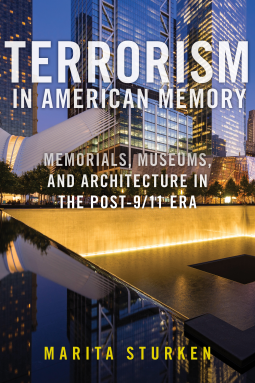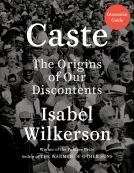
Terrorism in American Memory
Memorials, Museums, and Architecture in the Post-9/11 Era
by Marita Sturken
This title was previously available on NetGalley and is now archived.
Send NetGalley books directly to your Kindle or Kindle app
1
To read on a Kindle or Kindle app, please add kindle@netgalley.com as an approved email address to receive files in your Amazon account. Click here for step-by-step instructions.
2
Also find your Kindle email address within your Amazon account, and enter it here.
Pub Date Jan 18 2022 | Archive Date Feb 07 2022
Talking about this book? Use #TerrorisminAmericanMemory #NetGalley. More hashtag tips!
Description
The role of cultural memory in American identity
Terrorism in American Memory argues that the terrorist attacks of 9/11 and all that followed in its wake were the primary force shaping United States politics and culture in the post-9/11 era. Marita Sturken maintains that during the past two decades, when the country was subjected to terrorist attacks and promulgated ongoing wars of aggression, we have veered into increasingly polarized factions and been extraordinarily preoccupied with memorialization and the politics of memory.
The post-9/11 era began with a hunger for memorialization and it ended with massive protests over police brutality that demanded the destruction of historical monuments honoring racist historical figures. Sturken argues that memory is both the battleground and the site for negotiations of national identity because it is a field through which the past is experienced in the present. The paradox of these last two decades is that it gave rise to an era of intensely nationalistic politics in response to global terrorism at the same time that it released the containment of the ghosts of terrorism embedded within US history. And within that disruption, new stories emerged, new memories were unearthed, and the story of the nation is being rewritten. For these reasons, this book argues that the post-9/11 era has come to an end, and we are now in a new still undefined era with new priorities and national demands.
An era preoccupied with memory thus begins with the memorial projects of 9/11 and ends with the radical intervention of the National Memorial for Peace and Justice, informally known as the Lynching Memorial, in Montgomery, Alabama, a project that, unlike the nationalistic 9/11 Memorial and Museum in New York, dramatically rewrites the national script of American history. Woven within analyses of memorialization, memorials, memory museums, art projects on memory, and architectural projects is a discussion about design and architecture, the increased creation of memorials as experiences, and the role of architecture as national symbolism and renewal. Terrorism in American Memory sheds light on the struggles over who is memorialized, who is forgotten, and what that politics of memory reveals about the United States as an imaginary and a nation.
Available Editions
| EDITION | Other Format |
| ISBN | 9781479811687 |
| PRICE | $32.00 (USD) |
| PAGES | 336 |
Average rating from 3 members
Featured Reviews
We will never forget! In the wake of the horrific events on 9/11, Americans vowed to never forget the tragic events of that day & the Americans we lost. But how do you memorialize the events in an honorable manner for those we lost on that September day in 2001? Marita Sturken methodically examines the memorial sites for 9/11 in New York, Washington DC & Shanksville, PA. While these memorials were meant to honor the victims of the September 11th attacks, they are also painful reminders for many family members. Moving beyond 9/11, how much have the events of 9/11 shaped us as a country? Are we more polarized as a nation based on our experiences of 9/11? Sturken expands the discussion by viewing the massive protests & police brutality in recent years via the lens of the equal justice work of Bryan Stevenson in Montgomery, Alabama. Like the memorials of 9/11, the National Memorial for Peace & Justice memorialize the tragic events of our nation’s dark past. Prior to its opening in 2018, no other memorial commemorated these events in such a detailed manner.
This was a wonderful read! I learned a great deal from this book & I thoroughly enjoyed reading it. Having read Terrorism in American Memory, I plan to visit the sites of these memorials in the near future.
Thank you to Netgalley and New York University Press for a free copy of this upcoming book in exchange for an honest review. I would like to start by saying this book is entirely fascinating. 9/11 is easily the most talked about event in American history. However, that being said this book placed the 20 years since the attack in contexts that I had never thought of and had never seen argued before. This text examines the post 9/11 era in order to analyze the ways that we as a country choose to remember the events, memorialize them, and rebuild in their wake. The book makes some great points about the way that New York and the public at large have chosen to remember the attacks but look away from the events that came after and our role in them. I thought the author made a lot of great points about the 9/11 museum and the "designed by committee" feel that it has taken as well as the hypocrisy of the consumerism of the site. However, perhaps the smartest thing the author does here is use the last chapter to explore an entirely different museum and memorial in Alabama that examines history of slavery and all of the oppression of African Americans that followed and continues to this day. The contrast to the 9/11 museum and the way that it forces the visitor to grapple with the effects of the actions of a nation was an incredibly powerful way to end the book.
Readers who liked this book also liked:
We Are Bookish
LGBTQIAP+, Romance, Sci Fi & Fantasy
Keisha Lance Bottoms
Biographies & Memoirs, Nonfiction (Adult), Self-Help
Kelsey Barnard Clark
Cooking, Food & Wine, Entertainment & Pop Culture, Home & Garden
Elizabeth McKeon; Ralph Gevirtz; Julie Bandy
Biographies & Memoirs, Cooking, Food & Wine
Silvia Moreno-Garcia
Historical Fiction, Literary Fiction, Sci Fi & Fantasy















